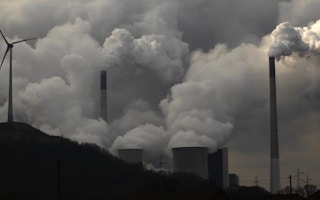Global carbon dioxide emissions will this year reach a new record as power stations, cars, buses, trains, aircraft, tractors, factories, farms and cement works continue to burn fossil fuels − releasing an estimated 40 billion tonnes of the greenhouse gas into the atmosphere.
And the world’s chances of limiting global average surface warming to 2°C – an ambition agreed by the world’s political leaders in Copenhagen in 2009 − are dwindling, according to new studies published just ahead of the United Nations summit on climate change opening in New York today.
Professor Pierre Friedlingstein, Chair in Mathematical Modelling of Climate Systems at Exeter University, UK, and a consortium of colleagues from the UK, Norway, Switzerland, Austria, Germany, the Netherlands and Australia report in Nature Geoscience that despite attempts to reduce fossil fuel dependence, greenhouse gas emissions have on average continued to grow by 2.5 per cent per year for the last decade.
Ration exhausted
This means that, if there is a ration or quota of emitted carbon dioxide consistent with a 2°C increase, then the world has already used up two-thirds of it. And if it goes on burning fuel at the 2014 rate, then this ration will be exhausted within 30 years.
“
Politicians meeting in New York need to think very carefully about their diminishing choices exposed by climate science
Corinne Le Quéré, director of the Tyndall Centre for Climate Change Research at the University of East Anglia, UK
The study, part of a package of papers and reflections in Nature Geoscience and Nature Climate Change calculated to inform debate and crystallise opinion, has been widely endorsed by other climate scientists.
David Reay, professor of carbon management at the University of Edinburgh, UK, said: “If this were a bank statement, it would say our credit is running out.”
The scientists, partners in a research consortium called the Global Carbon Project, list the top four emitters of carbon dioxide: China – emissions grew by 4.2 per cent; US – emissions increased by 2.9 per cent, thanks to a rebound in coal consumption; India – emissions grew by 5.1 per cent, as a result of robust economic performance; European Union – emissions actually fell by 1.8 per cent, due to weak economic growth.
“China now emits more than the US and EU combined and has CO2 emissions per person 45 per cent higher than the global average, exceeding even the EU average,” said one of the report’s authors, Robbie Andrew, a senior research fellow at the Centre for International Climate and Environmental Research – Oslo (Cicero), in Norway.
And co-author Glen Peters, also a senior research fellow at Cicero, said: “Globally, emissions would need sustained and unprecedented reductions of around 7 per cent per year for a likely chance to stay within the quota.”
Corinne Le Quéré, director of the Tyndall Centre for Climate Change Research at the University of East Anglia, UK, said: “The human influence on climate change is clear. We need substantial and sustained reductions in CO2 emissions from burning fossil fuels if we are to limit climate change.
“We are nowhere near the commitments necessary to stay below 2°C of climate change − a level that will already be challenging to manage for most countries around the world, even for rich nations. Politicians meeting in New York need to think very carefully about their diminishing choices exposed by climate science.”
Professor Friedlingstein stressed: “Delaying action is not an option. We need to act together, and act quickly if we are to stand a chance of avoiding climate change not long into the future, but within many of our own lifetimes.”
Most of the message in the Nature Geoscience paper is already familiar as scientists in Europe, Asia and the US have repeatedly stressed that even a 2°C increase in average global temperatures could have alarming consequences for hundreds of millions of people.
The timing of the publication is a reminder of the problem’s urgency, and many of the Nature Geoscience report’s authors also offer a prescription for action in the journal Nature Climate Change.
In this they try to outline ways in which the burden of reduction might be shared among the world’s nations. This is essentially a political problem that will require sustained international negotiation and argument.
Prof Myles Allen, who heads the Climate Dynamics Group at Oxford University, UK, said: “It is depressing that the immediate reaction to the news we have a limited carbon pie is discussion of how countries can slice it up. We didn’t save the ozone layer by rationing deodorant.”
Abstract goals
But David Victor, professor of international relations at the University of California San Diego, in an accompanying essay in Nature Climate Change, warns that researchers and campaigners “have focused too much scientific talent on abstract goals and not enough on understanding the practical actions that individual governments, firms and individuals would take to meet global goals”.
The New York summit is one of a series that will lead up to the UN climate change summit in Paris in 2015, and Prof Victor foresees a need for climate scientists to work with social scientists to understand better how attitudes change, and policies are decided.
He concludes: “It is highly unlikely that the Paris summit will deliver an accord that limits warming to 2°C, and hopes for that outcome in the scientific community are built on a naïve vision that science sets goals and that politicians, once they shed the scales from their eyes, will follow in lockstep.
“Awareness of what the behavioural sciences can bring suggests, as well, that the era of really important science is perhaps just beginning.”










